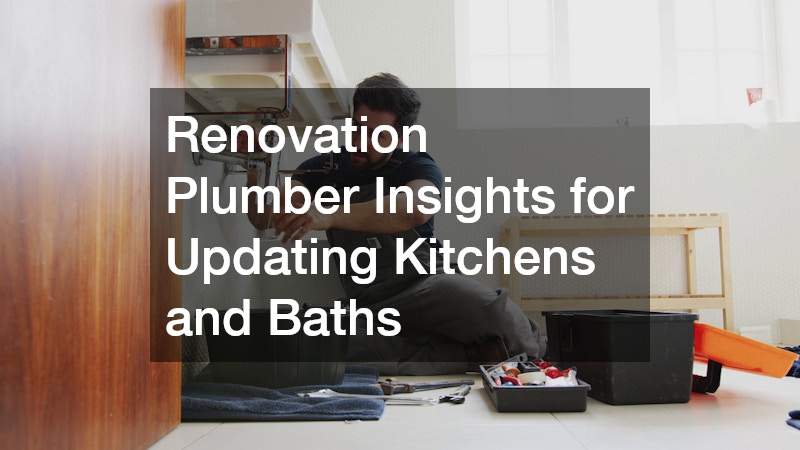Updating a kitchen or bathroom is exciting, but behind the new tile, sleek cabinets, and upgraded lighting sits a complex network of pipes and fixtures that must work seamlessly. That’s where the guidance of a renovation plumber becomes invaluable. These specialists understand how existing plumbing interacts with new layouts, materials, and modern appliances, making them essential partners in any remodel. Homeowners often think of plumbing only when something goes wrong, such as when they call an emergency plumber or rely on plumbing repair after an unexpected leak. But during a renovation, the stakes are different. Choices you make today influence performance, efficiency, maintenance needs, and long-term durability.
What Are The Common Plumbing Issues In Kitchen And Bathroom Renovations?

Common Leaks And Drips
Leaks are one of the most frequent headaches during a remodel, and a renovation plumber is often the first to spot brewing trouble. Kitchens and bathrooms have multiple fixtures tightly packed into small areas, so even minor leaks can quickly damage cabinets, flooring, and freshly installed finishes. During demolition, older pipes or connectors may crack, revealing issues that plumbers or an emergency plumber must address immediately. Sometimes these problems develop after new fixtures are installed, especially if the alignment between old and new components is imperfect.
Even homeowners working with a local plumbing service are often surprised at how many small drip points appear once walls and floors are opened up. A renovation plumber evaluates everything: shutoff valves, supply lines, p-traps, and even hidden connections behind appliances. These details matter because small leaks can go undetected until much later, causing long-term structural issues. Renovation work puts stress on existing plumbing, so having professionals who routinely handle plumbing repair ensures that any weaknesses are caught early. This is also where emergency plumbing services can be helpful if unexpected problems arise after hours, giving the project a safety net no homeowner should overlook.
Pipe Corrosion And Damage
Older homes commonly present corrosion inside metal pipes, and a renovation plumber knows exactly where to look. Corrosion might not be obvious until pipes are removed or altered during the remodel. When a plumber exposes aging galvanized steel or copper lines, they can advise whether full replacement is worth the investment. Many homeowners assume that their pipes are fine simply because they haven’t experienced major leaks, but hidden corrosion can reduce water pressure, strain fixtures, and contaminate water quality. In some cases, plumbers find pinhole leaks that only become active once the surrounding material is disturbed.
How To Choose The Right Fixtures For Your Renovation?
Types Of Fixtures Available
Choosing fixtures is often the most enjoyable part of a renovation, but a renovation plumber ensures your selections are compatible with existing systems. Sinks, faucets, tubs, and specialty fixtures come in countless designs, and not all options work with your home’s configuration. Plumbers often advise homeowners to consider how fixture depth, mounting styles, or valve structures affect installation. For instance, a wall-mounted faucet may require additional plumbing services to reroute supply lines, while a freestanding tub might need reinforced flooring and carefully placed drains.
Water Efficiency Ratings
Many modern fixtures offer impressive water-saving features, and a renovation plumber can help you understand which efficiency ratings truly matter. Labels like WaterSense and flow-rate specifications give insight into how faucets, toilets, and showerheads use water. While choosing low-flow options helps reduce utility bills, plumbers emphasize that performance must remain consistent. Some ultra-efficient fixtures require specific pressure levels, and if your home’s plumbing can’t deliver that, the result may be disappointing.
What Plumbing Codes Should I Be Aware Of?

Local Plumbing Codes And Regulations
Plumbing codes vary widely depending on your location, and a renovation plumber ensures your project meets all requirements. These codes govern everything from pipe size and vent placement to water heater installation and fixture spacing. Homeowners working without professional guidance often run into code violations that delay inspections or force unexpected rework. Plumbers know these rules well, and they help coordinate the renovation with building officials, contractors, and other trades.
Some regulations also influence your design choices. For example, certain areas require specific clearances around toilets or mandate anti-scald valves on new showers. Even the placement of drains may be dictated by local plumbing codes. A local plumbing service or plumbing contractor will interpret these rules for your specific project and prevent costly errors. If unexpected issues appear after demolition, emergency plumbing services may also step in to correct urgent code-related problems. Working with certified plumbers ensures your dream kitchen or bath is both stylish and fully compliant, avoiding trouble during final inspections.
Permitting Process For Renovations
Permits are another essential part of renovation planning, and the permitting process can feel overwhelming without the guidance of a renovation plumber. Most plumbing-related updates—whether relocating a sink, installing new supply lines, or replacing pipes—require permits. These documents verify that the work follows local codes and is performed safely. Plumbers often handle the permit applications on behalf of homeowners, simplifying the process and preventing delays.
How Can I Avoid Costly Plumbing Mistakes?
Common Mistakes To Avoid
A renovation plumber sees avoidable mistakes every day, and many of them stem from rushed decisions or incomplete planning. One of the biggest problems occurs when homeowners select fixtures before confirming plumbing compatibility. Another common issue is ignoring the condition of existing pipes, leading to unexpected plumbing repair later in the project. Sometimes DIY efforts introduce complications, especially if homeowners attempt tasks better left to plumbers or drain cleaners.
Effective Communication With Contractors
Clear communication prevents misunderstandings that can derail a project, and a renovation plumber plays a key role in coordinating with the rest of the renovation team. Kitchen remodelers, electricians, cabinet painters, and countertop installers all rely on accurate plumbing schedules. If plumbers arrive too early, they may have insufficient access to necessary areas; if they arrive too late, workers may need to undo completed sections to give them space.
A plumbing contractor often acts as the bridge between the homeowner and the rest of the crew, clarifying timelines and requirements. Sharing detailed plans, measurements, and fixture specifications ensures everyone stays aligned. Even emergency plumbing services appreciate clear documentation when they’re called in for urgent adjustments. Local plumber teams also rely on steady communication to avoid mistakes caused by assumptions.
By keeping every contractor informed, a renovation plumber helps maintain workflow efficiency. This prevents costly rework, scheduling conflicts, and material delays—common issues in kitchen and bath renovations. A proactive communication approach also reassures homeowners that the project is progressing smoothly, even when multiple specialists are involved.
What Does A Typical Plumbing Budget Include?

Estimating Costs For Materials And Labor
Budgeting is one of the most important parts of a kitchen or bath upgrade, and a renovation plumber helps homeowners understand where the money actually goes. Plumbing materials range from pipes and fittings to shutoff valves, fixtures, and drain components, and each choice affects overall cost. Labor varies based on the difficulty of the job, the condition of existing plumbing, and the accessibility of work areas. Plumbers often provide line-item estimates to show what’s involved in everything from moving a sink to installing modern appliances.
Unexpected Expenses To Plan For
Even with the best planning, surprise costs sometimes arise, and a renovation plumber prepares clients for this reality. Older homes might reveal corroded pipes, water-damaged areas behind walls, or outdated plumbing layouts that no longer meet building codes. Plumbers or drain cleaners may discover blockages requiring additional work. A plumbing contractor often recommends setting aside a contingency fund for these surprises, usually around 10–20% of the total plumbing budget.
How Do I Prepare My Home For Plumbing Work?
Clearing And Protecting The Work Area
Preparing the workspace is crucial for efficiency and safety, and a renovation plumber will usually provide clear instructions before work begins. Removing clutter, relocating appliances, and protecting flooring allows plumbers to move freely and prevents accidental damage. Homeowners can help by clearing out under-sink cabinets, emptying vanity drawers, and securing fragile décor nearby. This simple preparation speeds up the work of plumbers and reduces the risk of delays.
Using protective coverings on floors and countertops helps keep dust and debris from spreading throughout the home. A local plumbing service may bring their own protective materials, but homeowners often add extra layers for peace of mind. When major demolition is involved, communication becomes even more important. A plumbing contractor or local plumber may need temporary access to basements, crawlspaces, or utility closets. In some cases, emergency plumber visits occur during these phases if fragile pipes break or if unforeseen conditions arise. A renovation plumber can outline exactly how to prepare so the job proceeds smoothly from day one.
Accessing Plumbing Access Points
Plumbing work requires clear access to valves, drains, and supply lines, and a renovation plumber knows how to identify the most critical locations. These access points may be hidden behind appliances, inside cabinets, or beneath flooring. Before work begins, homeowners should ensure these areas are open and safe to reach. If furniture, boxes, or stored goods block key plumbing routes, the crew may spend unnecessary time moving items instead of installing lines or fixtures.
Some access points might not have been used in years, so lighting and ventilation are important. Plumbers and drain cleaners often need easy entry to these areas to diagnose issues or complete thorough inspections. If work involves a tight crawlspace, a plumbing contractor will guide the homeowner on preparing it properly. In rare situations, emergency plumbing services might be required if aging components fail when pressure is tested. With guidance from a renovation plumber, homeowners can make sure all access points are safe and ready, helping the entire project run more efficiently.
What Are The Benefits Of Hiring A Professional Plumber?

Expertise And Experience
Plumbing looks simple on the surface, but in reality it requires deep technical knowledge, especially during renovations. A renovation plumber brings years of experience dealing with the complexities of older homes, modern fixtures, and the unique challenges hidden behind walls and floors. Their expertise reduces the risk of incorrect installations, leaks, or compatibility issues. Plumbers also understand how plumbing interacts with electricity, cabinetry, ventilation, and structural elements, which makes them invaluable during planning.
Many homeowners are tempted to rely on DIY approaches, but improper work can lead to costly plumbing repair later. A plumbing contractor ensures materials meet required standards, that pressure levels remain safe, and that every fitting is secure. Local plumbing service teams bring specialized tools and advanced diagnostic equipment that most homeowners don’t own. Even when unforeseen complications arise, emergency plumber teams can respond efficiently. Working with certified professionals protects both the renovation and the long-term health of the home’s plumbing system.
Warranty And Insurance Considerations
One of the biggest advantages of hiring professional plumbers is the protection offered by warranties and insurance. A renovation plumber usually guarantees their work for a set period, ensuring that any issues related to installation are corrected at no extra cost. This peace of mind is especially important in a renovation, where multiple contractors overlap and plumbing mistakes can damage newly installed materials.
Insurance coverage is another crucial factor. A plumbing contractor carries liability insurance that protects homeowners if accidental damage occurs on-site. Local plumber teams also follow strict safety protocols, minimizing risk throughout the project. Homeowners using emergency plumbing services benefit from quick documentation of urgent repairs, which can be helpful for insurance claims if major damage occurs. Overall, working with trained plumbers ensures your renovation is not only well-executed but also financially protected.
What Innovations Should I Consider For My Renovation?
Smart Plumbing Technology
Modern plumbing innovations offer exciting upgrades for kitchens and baths, and a renovation plumber can help identify which technologies provide real value. Touchless faucets, leak-detection sensors, digital shower systems, and Wi-Fi–enabled appliances all enhance convenience and efficiency. Plumbers understand how these systems connect to existing water lines, drainage networks, and electrical components, ensuring seamless installation.
Smart technology can also help homeowners avoid costly damage. For example, some leak-detection devices automatically shut off water when they sense unexpected moisture. Plumbers and drain cleaners often recommend these systems in homes with older pipes or multiple fixtures. A plumbing contractor can verify compatibility between new tech and your existing plumbing services, helping you choose the best features for long-term reliability. Consulting with a renovation plumber early ensures the wiring and valves required for smart tech are integrated into the remodel from the start.
Eco-Friendly Plumbing Solutions
Sustainable design has become a priority for many homeowners, and a renovation plumber is well-versed in eco-friendly options. Low-flow fixtures, greywater recycling setups, and high-efficiency water heaters reduce environmental impact while delivering excellent performance. Plumbers can explain how each choice influences water usage, maintenance needs, and overall cost savings. Some green solutions may require upgraded drain configurations or pressure adjustments, which makes early planning essential.
A successful renovation depends on much more than selecting attractive finishes or modern appliances. Plumbing plays a central role in how well your updated kitchen or bathroom functions, and that’s why the guidance of a renovation plumber is so valuable. These professionals help uncover hidden issues, ensure compliance with local code requirements, and coordinate closely with other contractors to prevent delays or costly mistakes. From choosing high-performing fixtures to understanding the long-term implications of pipe materials, their expertise ensures your renovation stands the test of time..





